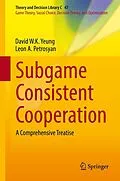Strategic behavior in the human and social world has been increasingly recognized in theory and practice. It is well known that non-cooperative behavior could lead to suboptimal or even highly undesirable outcomes. Cooperation suggests the possibility of obtaining socially optimal solutions and the calls for cooperation are prevalent in real-life problems. Dynamic cooperation cannot be sustainable if there is no guarantee that the agreed upon optimality principle at the beginning is maintained throughout the cooperation duration. It is due to the lack of this kind of guarantees that cooperative schemes fail to last till its end or even fail to get started. The property of subgame consistency in cooperative dynamic games and the corresponding solution mechanism resolve this "classic" problem in game theory.
Autorentext
Inhalt
Introduction.- Subgame Consistent Cooperative Solution in Differential Games.- Subgame Consistent Cooperation in Stochastic Differential Games.- Subgame Consistency in Randomly-Furcating Cooperative Stochastic Differential Games.- Subgame Consistency under Asynchronous Players' Horizons.- Subgame Consistent Cooperative Solution in NTU Differential Games.- Subgame Consistent Cooperative Solution in Dynamic Games.- Subgame Consistent Cooperative Solution in Random Horizon Dynamic Games.- Subgame Consistency in Randomly-Furcating Cooperative Stochastic Dynamic Games.- Subgame Consistency under Furcating Payoffs, Stochastic Dynamics and Random Horizon.- Subgame Consistency in NTU Cooperative Dynamic Games.- Applications in Cooperative Public Goods Provision.- Collaborative Environmental Management.- Cooperation with Technology Switching.- Applications in Business Collaboration
